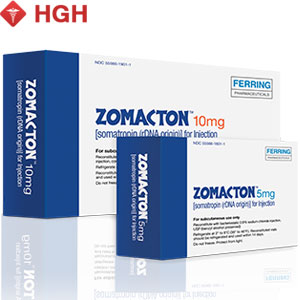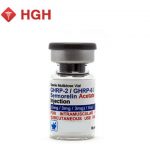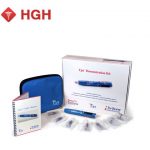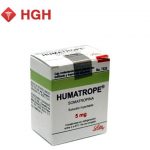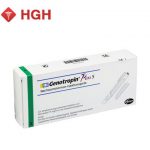 HGH is a protein that is secreted and produced by the anterior pituitary gland. Of all the hormones produced by the pituitary gland, this is produced in the largest quantities. Secretion and formation of the HGH is controlled by the hypothalamic somatostatin and releasing - hormone. Both of these factors are produced by the hypothalamus. HGH is produced throughout the life.
HGH is a protein that is secreted and produced by the anterior pituitary gland. Of all the hormones produced by the pituitary gland, this is produced in the largest quantities. Secretion and formation of the HGH is controlled by the hypothalamic somatostatin and releasing - hormone. Both of these factors are produced by the hypothalamus. HGH is produced throughout the life.
Every day a person needs to eat at least 1.5 grams of protein per kilogram of their body weight. Also, to increase the production of HGH it is necessary to combine protein food with physical activity (HGH and mechanical growth factor). A great way to increase the production of HGH is a combination of vitamins E and C. This combination can increase the levels of HGH by 23% .This method is one of the best - HGH gives vital energy to your body, and vitamins will have a positive effect on the skin, nails and hair. In connection with this, if you want always to feel well, you must include in your diet seven products. HGH and diet will create conditions for the normalization of all body systems.
HGH diet plan
When one prominent toxicologist was asked what kind of food he considered the most harmful to human health, he replied: "I eat everything. So, I do not give preference to any of the toxins."
This is one reason why you should consume a wide variety of food products. The other is that you have to deliver to your body everything it needs. The best way to get everything you need is to eat food from the four main groups:
- Fruit and vegetables
- Cereals
- Dairy products
- Meat
HGH diet menu
The best hgh diet menu should include the following ingredients:
- Meat
Beef, lamb and veal contain large amount of protein. Rabbit meat, which is low-calorie, contains essential amino acids for the body.
- Poultry
Chicken is a valuable source of protein. The regular use of it makes it possible to get rid of excess fat. Chicken, stimulating the production of HGH, has a double effect in the fight against excess weight.
- Seafood
Seafood contains high quality protein and a large number of important nutrients. For example, shrimps, due to their high protein content, satisfy your appetite, ensure the normal activity of the nervous system and the production of hemoglobin.
- Fish
Fish contains all the necessary amino acids for the human body. Fish protein has a low content of connective tissues. Because of this fish is absorbed by the body by 95%. The most rich in protein fish is salmon, tuna, herring, trout, mackerel.
- Curds
The content of curds includes proteins which are easily cleaved at amino acids necessary for the body. Curds contain very little fat, so this is useful for those who wish to get rid of extra pounds or build muscles. Nonfat milk product contains about 28% of protein.
- Cheese
Cheese contains about 22% of protein. In addition, it has a large amount of zinc, calcium and phosphorus. For example, 70 gram of cheese is equal to a daily rate of calcium.
- Eggs
Eggs are the best natural product which contains large amounts of protein. One egg has 6 grams of protein. Many minerals and vitamins are also present in eggs.
Three basic nutrients in hgh diet
All kinds of food necessary to be present in all hgh diets can be divided into three parts - carbohydrates, fats and proteins. The first two components provide the body with fuel, and the third part supplies the body with raw materials necessary for the production of cells and tissues.
Carbohydrates
- Carbohydrates contain 4 calories per gram.
- The brain and nervous system are fed off glucose, and carbohydrates deliver them.
- Carbohydrates feed the muscles during exercises.
- Carbohydrates help maintain proteins in tissues.
- When the carbohydrate reserves are depleted, the body converts proteins to carbohydrates.
- In order to prevent destruction of proteins in the body the person needs 100 - 150 g of carbohydrates.
- Carbohydrates participate in the cleavage of the free fatty acids.
- Complex carbohydrates- fruits vegetables, unrefined grains - slowly turn into blood sugar and are more durable energy sources. They are also good sources of vitamins, minerals and cellular tissue.
Fats
All fats contain nine calories per gram. Fats is the main form of energy storage. They are a source of energy for long, but not too intense exercises. Fats serve as "shock absorbers" for the organs. Fats provide protection against heat and cold. Fats are sources of vitamins A, D, E and K.
Proteins
Proteins contain 4 calories per gram. Proteins are the basis of life. Proteins make up half of the dry weight of the body, including muscles, skin, bones, hair, teeth, eyes, nails and scar tissue.
- Proteins are hormones and enzymes that control the entire life of the organism.
- Proteins help maintain water and acid-base balance, provide resistance to diseases, carry oxygen in blood, support growth and repair of cells and tissues.
- Proteins provide 10-15 percent of the total energy consumption during prolonged exercise.
- Proteins are produced from animal and vegetable sources.
- Excess protein is converted into fat and stored in fat cells.
Four other vital components of hgh diet
Food and drinks contain four essential elements necessary to maintain a healthy body and stimulating growth hormone - vitamins, minerals, cellular tissue and water.
Vitamins
- Vitamins help release energy from fats, carbohydrates and proteins.
- Vitamins are essential for the formation of red blood cells, connective tissue proteins and DNA.
- Vitamin deficiency causes a disturbance in the body processes.
- Fat-soluble vitamins are stored in body fat and are not required on a daily basis. Four of such vitamins are A, D, E and K. The excess of vitamin A and D may be toxic.
- Water-soluble vitamins are not stored in fat and their deficiency may occur in two-four weeks. Excess is excreted in the urine, thereby poisoning happens rather rare.
- Nine of these vitamins are C and B-complex, which comprises thiamine (B1), riboflavin (B2), niacin, pyridoxine (B6), cyanocobalamin (B12), folic acid, pantothenic acid and biotin.
- Some of the vitamins such as C, E and beta-carotene, which is absorbed as vitamin A, are powerful antioxidants that protect cells from free radicals.
Minerals
- Minerals are involved in cellular and energy metabolism.
- Minerals act as enzymes or coenzymes in the regulation of chemical reactions.
- Minerals are important for muscle contraction.
- Minerals support the water and acid-base balance.
- Minerals are involved in the transmission of nerve signals.
- Minerals are involved in the formation of teeth and bones, hemoglobin, protein synthesis and the development of hormone.
- The body require essential minerals in the amount of more than 100 mg per day. There are six of them: calcium, phosphorus, magnesium, sodium, potassium and chloride.
- Other minerals are required in the amount less than 100 mg per day, and are contained in the body in small amount. There are fourteen of them: chromium, cobalt, copper, fluorine, iodine, manganese, molybdenum, nickel, selenium, silicon, tin, vanadium, zinc
Cellulose
- Cellulose is not formally a nutrient because it is not digested. The source of cellulose are fresh fruit and vegetables, unrefined grains, nuts, seeds and legumes.
- Cellulose makes stool denser and accelerates the removal of waste products from the body through the gastrointestinal tract.
- Cellulose absorbs fat, fills the stomach, knocks the appetite.
- Cellulose may reduce the risk of colon cancer and other cancers of the intestine.
- It is recommended to consume 25-40 grams of cellulose per day, while the average American consumes 18-20 grams per day.
- Excessive intake of cellulose in the form of bran may cause oversaturation of the body with calcium, magnesium and zinc.
Water
- Water is the most important nutrient for life. We can live for weeks without food, but only a few days without water.
- Water makes up two thirds of the body and 85 percent of the brain.
- Water is necessary for almost all vital processes, including digestion, blood circulation and excretion of waste.
- Water is a major component of blood and lymph.
- Water regulates body temperature, lubricates joints and organs, moisturizes the skin, supports muscle strength.
- Dehydration, especially in hot weather and during exercises, causes loss of electrolytes such as sodium and potassium, and in advanced stages can be life-threatening.
- We need about 2 liters, or 8-10 glasses of water a day. It is especially important after exercises to replenish the reserves of water.
- If you drink a glass of water before a meal, it reduces appetite.
- Distilled water absorbs the poisons contained in the body and removes them from the body.
HGH diets that stimulate hgh
Using the above information about the nutritional elements, you can develop hgh diet plan that includes all seven elements of the program to increase HGH levels. These seven elements are:
- Take HGH releasers.
- Accumulate proteins.
- Hold the fats low.
- Eat plenty of carbohydrates with a low glycemic index.
- The intervals between meals should not be less than five hours.
- Fast one day every two weeks (optional).
- Make the HGH stimulating exercises.
When you follow these rules in your hgh diet, it is important not how much you eat at all, but the amount of every food components you consume.
